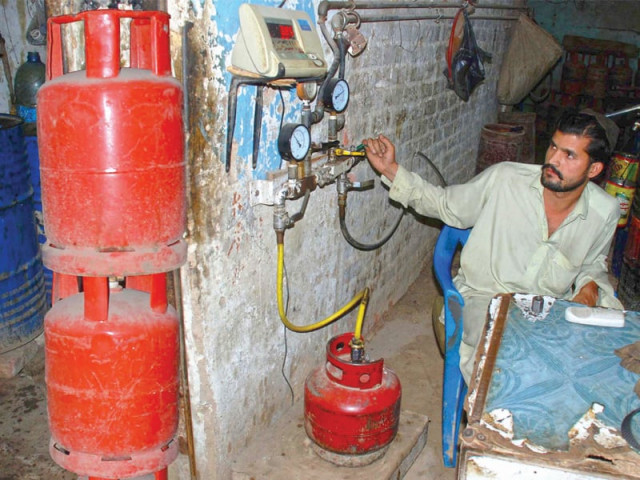In an explosive city, a different kind of bomb roams the streets
Several buses have installed LPG cylinders that cannot withstand high gas pressure.

With an increase in the number of CNG cylinder explosions, it is no surprise to see scared commuters line up outside filling stations. Every bus or car that pulls up is like a ticking bomb, ready to go off.
According to the Hydrocarbon Development Institute of Pakistan (HDIP), 3.5 million vehicles in the country are using compressed natural gas (CNG). In Karachi, nearly 70 percent of public transport vehicles, such as buses, minibuses and coaches, have been converted to CNG, though some of them are now using Liquid Petroleum Gas (LPG) as an alternative during the CNG crisis.
“We converted our vehicles to CNG because it was cheap and the government encouraged us to,” said Karachi Transport Ittehad (KTI) vice president Tawab Khan, adding that, “now we are stuck in the CNG crises”.

The buses have cylinders installed by dealers certified from the Oil and Gas Regulatory Authority (OGRA) but “due to the CNG crises some of the bus owners have installed an extra cylinder to keep more gas in their vehicles”, said Khan. These extra cylinders are of much lower quality because they are designed for carbon dioxide and oxygen, he explained.
According to Khan, the cylinder that exploded recently at a CNG station on Abul Isphahani Road was designed for carbon dioxide. That accident forced bus drivers to remove these alternate cylinders because they cannot stand the pressure of CNG, he said.
Hydrocarbon Development Institute of Pakistan (HDIP) general manager Habibur Rehman explained that CNG cylinders are designed for 200 bars of gas pressure, which is equivalent to 3,000 pound per square inch (PSI). The CNG stations around the city refill at 200 bars, while other cylinders - designed for LPG, oxygen and carbon dioxide - can only withstand low pressures.
So when bus drivers fill these alternative cylinders, they burst at high pressures. “People have no idea that a substandard cylinder is not less than a bomb that can blow up in less than a second,” he said.
Under the 1992 rules, all CNG stations are bound to ensure that the cylinders are following the standards prescribed by Ogra. “If a cylinder is of substandard quality, or does not have HDIP’s certificate of hydrostatic test, the station should not refill the cylinder,” said Rehman. All the workers need to do is check for the number NZS 5454 - a standard approved by Ogra - on the cylinder and clear it for filling.
Switching from CNG to LPG
Meanwhile, a few bus drivers have installed LPG kits in their vehicles, besides the CNG ones already in place. LPG cylinders cannot be refilled, and should only be replaced with new ones once they are empty, said KTI’s Khan.
Despite the ban, hundreds of people are involved in this business, said Ghulam Abbas Soomro, the deputy plant manager at Foundation Gas, an LPG cylinders filling unit in Korangi. “It is Ogra’s duty to take action against illegal dealers,” he said, adding that LPG cylinders can only withstand pressure between 100 and 140 PSI.
“We have our own cylinders, which we sell only to our authorised distributors. They bring the cylinders and we fill them at our plant.”
KTI’s Khan said that CNG workers have started checking the buses thoroughly but Malik Khuda Baksh, who works at a CNG station, admitted that this is not an easy job. With the long queues during the current CNG crisis, people are not willing to wait even a minute for a cylinder check-up, he said. “Also, the law and order situation in Karachi does not allow us to bother people, as they resort to guns very quickly.”
Published in The Express Tribune, December 14th, 2012.



















COMMENTS
Comments are moderated and generally will be posted if they are on-topic and not abusive.
For more information, please see our Comments FAQ